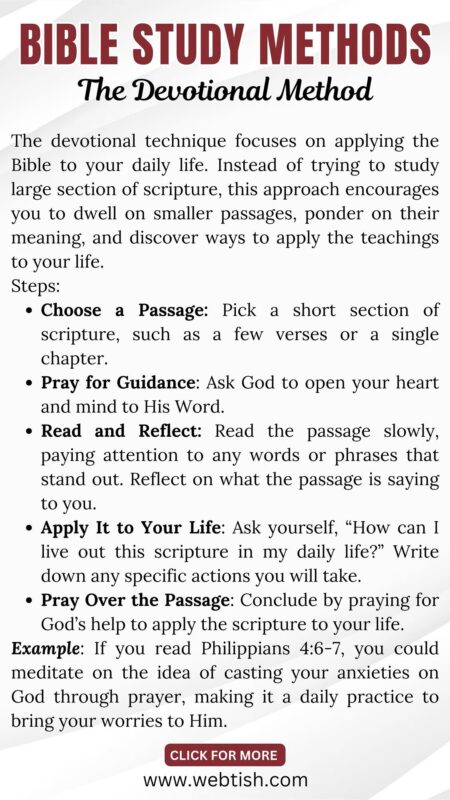Studying the Bible is one of the most uplifting spiritual excercise for Christians, bringing understanding, guidance and a better relationship with God.
However, learning how to study the Bible efficiently can be tough, especially for beginners. This post will walk you through several Bible study methods to help you get the most out of your time in the Word. Whether you are new to Bible study or looking to deepen your existing practices, these approaches will help you on the journey to a more meaningful and engaging experience.

1. The Devotional Method
The devotional technique focuses on applying the Bible to your daily life. Instead of trying to study large section of scripture, this approach encourages you to dwell on smaller passages, ponder on their meaning, and discover ways to apply the teachings to your life.
Steps:
- Choose a Passage: Pick a short section of scripture, such as a few verses or a single chapter.
- Pray for Guidance: Ask God to open your heart and mind to His Word.
- Read and Reflect: Read the passage slowly, paying attention to any words or phrases that stand out. Reflect on what the passage is saying to you.
- Apply It to Your Life: Ask yourself, “How can I live out this scripture in my daily life?” Write down any specific actions you will take.
- Pray Over the Passage: Conclude by praying for God’s help to apply the scripture to your life.
Example: If you read Philippians 4:6-7, you could meditate on the idea of casting your anxieties on God through prayer, making it a daily practice to bring your worries to Him.

2. The Chapter Summary Method
The chapter summary approach helps you grasp greater chunks of the Bible by summarizing chapters in your own terms. It encourages thorough reading and helps you grasp the important components of each chapter.
Steps:
- Read the Chapter Thoroughly: Start by reading the chapter multiple times to get a clear understanding.
- Summarize the Main Theme: Write a brief summary of the chapter’s main theme or message in your own words.
- Identify Key Verses: Choose one or two verses that stand out as the most important or impactful.
- Reflect on Personal Lessons: Think about how the chapter relates to your life and what lessons it holds.
- Write a Title for the Chapter: Give the chapter a unique title that captures its essence.
Example: When summarizing Psalm 23, you might identify “The Lord as Shepherd” as the main theme, choose verse 1 as a key verse, and reflect on how God’s guidance is present in your life.
3. The Word Study Method
This technique focuses on individual words to reveal deeper meanings. Understanding the original language or looking at how a word is used throughout the Bible might yield greater insights.
Steps:
- Choose a Word: Pick a significant word from a verse or passage, such as “grace,” “faith,” or “peace.”
- Look Up the Original Meaning: Use a Bible dictionary or concordance to find the word’s original Hebrew or Greek meaning.
- Find Related Scriptures: Look for other verses that use the same word to see how it’s used in different contexts.
- Write Down Your Insights: Record what you’ve learned about the word and its significance in the passage.
- Reflect on Its Application: Think about how understanding the word enhances your view of the scripture and how it applies to your life.
Example: If you study the word “agape” (Greek for unconditional love), you can explore its use in 1 Corinthians 13 and other passages, deepening your understanding of God’s love.
4. The Topical Study Method
This strategy entails studying a certain theme in the Bible, such as prayer, forgiveness, or the Holy Spirit, by looking at various verses regarding to that topic.
Steps:
- Select a Topic: Choose a subject you’re interested in exploring, such as “faith.”
- List Relevant Verses: Use a concordance or Bible software to find verses related to the topic.
- Group Verses by Subtopics: Categorize the verses under different subtopics (e.g., “Faith in God,” “Faith During Trials”).
- Summarize the Teachings: Write down the main teachings you find in the verses.
- Apply the Lessons: Reflect on how these teachings can impact your daily life.
Example: If you study “forgiveness,” you can analyze verses like Matthew 6:14-15 and Colossians 3:13 to understand God’s expectations for forgiving people and how it might bring healing to your relationships.
5. The Inductive Bible Study Method
The inductive technique is a more in-depth strategy that incorporates three basic steps: observation, interpretation, and application. It helps you explore deeper into the scriptures to understand their meaning and relevance.
Steps:
- Observation: Ask, “What does the passage say?” Look for who, what, when, where, and why in the passage.
- Interpretation: Ask, “What does the passage mean?” Try to understand the context and the author’s original intention. Consider cultural and historical backgrounds.
- Application: Ask, “How does this passage apply to me?” Think about practical ways to live out the teachings in your daily life.
Example: When studying James 1:2-4, you might observe that the passage talks about trials, interpret that it encourages finding joy in the growth that comes from hardships, and apply it by changing how you approach challenges in your own life.
6. The Biographical Study Method
Studying the lives of persons in the Bible can provide useful lessons into faith, obedience, and God’s action in different situations. The historical study technique focuses on understanding biblical characters and their relationship with God.
Steps:
- Choose a Character: Select a person in the Bible, such as David, Ruth, or Paul.
- Read Passages About the Person: Look for all the scriptures that mention the person.
- Summarize Their Life: Write a summary of the person’s life, including significant events and their relationship with God.
- Identify Strengths and Weaknesses: Reflect on the character’s positive qualities and shortcomings.
- Apply Lessons Learned: Think about how their experiences can inform your own walk with God.
Example: If you study the life of Joseph, you may learn lessons about perseverance, faith, and forgiveness from his path from being sold into slavery to becoming a ruler in Egypt.
7. The Book Study Method
The book study method entails studying a whole book of the Bible, allowing you to understand its message as a whole. This approach helps you see the structure, themes, and flow of the book.
Steps:
- Choose a Book: Pick a book that you are interested in, such as Philippians or Genesis.
- Read the Book Several Times: Familiarize yourself with the overall message and themes.
- Divide the Book Into Sections: Break it down into smaller sections or chapters.
- Study Each Section Thoroughly: Take notes on key themes, verses, and lessons in each part.
- Reflect on the Book’s Message: Summarize what the entire book teaches and how it applies to your life.
Example: If you read the book of Ephesians, you can study its teachings on grace, unity, and the Christian walk, drawing references to your own faith journey.
Tips for Effective Bible Study
- Set Aside Regular Time: Consistency is key. Aim for a specific time each day or week for your study.
- Pray for Understanding: Always start with prayer, asking the Holy Spirit to guide you.
- Use Bible Study Tools: Make use of study Bibles, commentaries, dictionaries, and concordances.
- Join a Bible Study Group: Discussing the scriptures with others can provide new insights and accountability.
- Journal Your Findings: Writing down your thoughts and discoveries can help you remember what you’ve learned and track your spiritual growth.
Conclusion
The Bible is a living and powerful book that can transform lives. By using these methods, you can approach scripture in a structured and meaningful way, allowing you to uncover deeper insights and strengthen your faith. Remember, the goal of Bible study is not just to gain knowledge, but to grow in your relationship with God and live out His Word daily.
No matter where you are in your faith journey, there is always more to learn and experience in the Bible. Pick a method that resonates with you, and dive into the Word today!